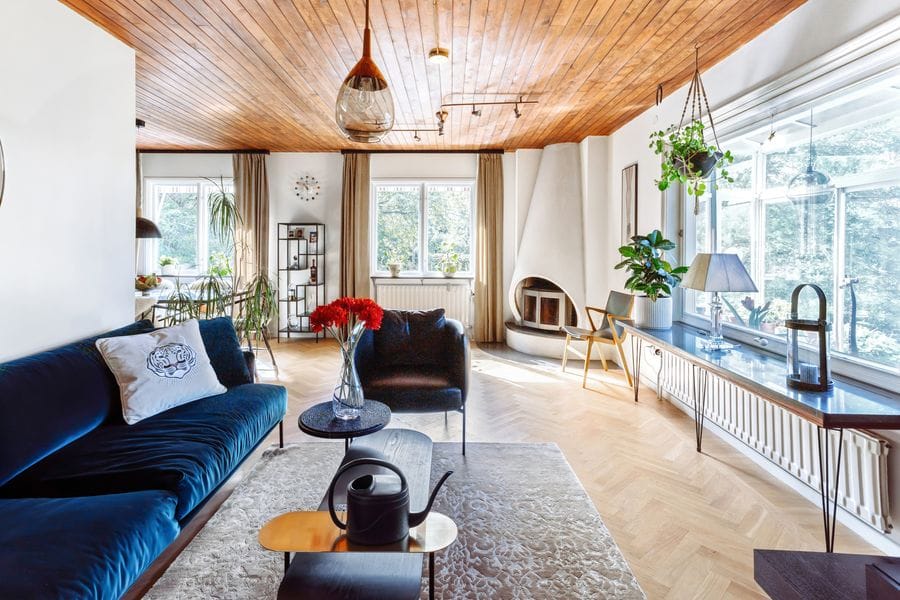Reimagining Retirement: Traveling the World by Exchanging Your Second Home
Say goodbye to hotel bills and the stress of constant packing. Discover how a home exchange can make your retirement affordable, comfortable, and full of adventure.

Like many, you’ve dreamt about your retirement for years and perhaps mapped out how it’ll go. You already know all the countries you want to visit and all the items you want to tick off your bucket list.
You’ve paid the price, working all these years, and deserve the endless fun coming your way. But what if there were a way to make your travel around the world much more seamless? A way to reduce how much you spend on every trip without sacrificing the comfort and luxury you’re accustomed to.
This isn’t one of those guides that advises you to make coffee at home or provide other penny-saving tips. No, this guide is about leveraging an asset you already have: your home.
You can easily swap homes with other like-minded travelers or luxury homeowners. This provides an affordable way to travel the world while feeling at home, wherever you go.
In this comprehensive guide, we explore how home exchange works, its benefits, potential downsides, and how to prepare your property for home exchange.
How home exchange works

Home exchange is a simple concept. Traditionally, two parties arrange to spend time in each other’s properties.
So, for example, Tim in Paris and Sarah in Santorini agree to swap homes. Tim’s house is available sometimes in August, the time Sarah needs a place to stay in Paris. Sarah’s house is available in December, and this also works for Tim.
The timing works for both parties, and they finalize the exchange. When August comes, Sarah will live in Tim’s house during her Paris visit. And in December, Tim will live in Sarah’s house on his Santorini visit.
But there are times when the timing does not work for both parties. So, for example, Sarah cannot wait till December for her Paris visit, but the timing works for Tim. On HomeExchange Collection, Sarah can still permit Tim to stay at her home in August in exchange for GuestPoints.
She can then use these GuestPoints to stay at other members’ homes all around the world, from South Africa to Ireland, Bali, and San Francisco in the United States.
Here’s the summary of all the steps required to start exchanging your home:
- Join a home exchange platform that caters to your needs. If you have a luxury home, a platform like HomeExchange Collection is the smart choice for maintaining luxury while traveling in retirement.
- Create your listing by uploading high-quality pictures of your home and providing descriptive details of all amenities and what guests stand to enjoy.
- Browse for homes in locations you’re interested in traveling to and connect with homeowners with availability that works for you. On HomeExchange Collection, you can use our powerful search tool to filter homes based on your preferences, like pet sitting.
- Agree with your host and finalize all details, including house rules and other logistics.
Who can participate in a Home exchange?
Anyone with their own home or space can participate in a house exchange. The only limiting factor is the criteria set by the home exchange platform you sign up for.
For example, the eligibility criteria for HomeExchange Collection include:
- Minimum value of $1.5 million
- Elegant and refined design
- High-end amenities like sauna, pool, in-home theater, gym, jacuzzi, and more
- Desirable locations like international cities, luxurious tourist destinations, and remote locations where guests can connect with nature
What are the benefits of home exchange?

Retirement travel home exchange with your home offers many benefits, including:
1. Save money as you travel the world
One of the major outlays while traveling the world is on accommodation. According to the European Union, travel accommodation expenses account for about 36% of all travel expenditure. That’s a lot.
Rather than paying for pricey hotels or vacation rentals, you get to enjoy free accommodation, without lowering your high standards. You’re not staying in a run-down hotel or barely-put-together house, but staying in a luxurious, thoughtfully designed, furnished, and fully-stocked home that real people live in.
As a retiree, prudence is a great virtue. And saving 36% from all trips gives you more wiggle room to spend on actual experience and enjoy your travels even better.
Moreover, home swapping also eliminates additional accommodation costs like cleaning and service fees.
With an annual membership fee that's less than a couple of hotel stays, HomeExchange Collection gives you unlimited exchanges to swap homes yearly at stunning properties worldwide.
2. Enjoy a more authentic travel experience
There’s something about staying in hotels while traveling that makes it feel more like a business trip. Maybe it’s their location, as most high-end hotels are located in business districts and busy areas.
House swapping typically happens with properties in regular, proper residential areas. Staying in residential areas means you can experience the local culture much better, as you can live like a local.
In addition, your host can share first-hand tips to help you enjoy your stay, and you won’t have to depend on cookie-cutter, one-size-fits-all tips from travel websites.
3. Guests can help watch your pets
Getting a pet sitter or having to arrange for your pet(s) to stay elsewhere is not fun, and definitely not straightforward. Pet sitters are also costly. Pet sitters charge anywhere between $45 to $75 per night.
On many home exchange platforms like HomeExchange Collection, you can seek out guests who are open to pet sitting and watering your plants. This takes a significant burden off your hands, allowing you to travel with more peace of mind.
4. House swapping is so flexible
As a retiree, you should be free as a bird. Want to visit a new place and only spend a short weekend? What about a long, extended stay of several months in a new country? You should get that too.
Home exchange caters to various durations, destinations, and dates, making it a perfect luxury home exchange for retirees who don’t want to be pinned down anywhere longer than they want.
5. Better privacy
Home exchange offers better privacy than hotels in the sense that the whole property is yours and not just a single room.
You can cook your own meals in the kitchen, sunbathe in a backyard garden, or just enjoy a quiet evening stargazing without multiple interruptions.
There’s no sharing of common areas or being worried about strangers in the pool while you’re in it. It’s almost like you never left home.
6. Home exchange protects your interest
With the presence of guests in your home, there’s a lower probability of a break-in or theft.
And if you’re worried about your guests breaking or stealing things, worry not! HomeExchange Collection provides guardrails to ensure your property is safe and protected.
The eligibility criteria ensure you only attract like-minded people to your property while staying in someone else’s home.
Moreover, HomeExchange Collection offers homeowners up to $2,000,000 in property damage protection. Also, if your host cancels for whatever reason, HomeExchange Collection compensates you at a rate of up to $350 per night till you can arrange another swap.
The downsides of a home exchange
Is everything smooth sailing with home exchange? Or are there potential risks to anticipate? The truth is, there are, and they include:
Risk of unfair exchanges
Home swapping is essentially a trade by barter. So, it’s possible to swap homes that may end up feeling like you’ve been cheated. The same concerns apply whether it’s a luxury or regular home swap.
That’s why HomeExchange Collection has strict eligibility criteria to ensure all home exchangers have a blissful experience.
These houses are further vetted manually to ensure hosts are not exaggerating their claims.
Risk of damage and theft
There is also a low risk that guests may damage or steal your property. If you’re on HomeExchange Collection, then worry not. HomeExchange Collection offers protection against damage, up to $2 million
How to prepare your home for exchange

It doesn’t matter if it’s your first exchange or you’re a veteran, the same principle applies: make your guests feel like kings and queens.
Good preparation also ensures you and your guest are on the same page with respect to your house rules and maintenance. With a few thoughtful steps, you can give your guests a seamless experience while ensuring your property gets the care it needs.
Clear communication before guest arrival
It’s super important to discuss specifics with your guests before confirming the exchange. Find out about their arrival and departure, if they’re bringing pets or if they can take care of one, if they’re bringing kids, etc.
This is also when you discuss key exchange and what you expect them to do before leaving.
When you provide clarity to your guests, they can confirm if they’re okay with your requests. And then you can proceed to confirm the exchange.
Declutter and clean
A clean home is non-negotiable and feels more welcoming. Focus on every area and ensure you wipe down your fridge, clean the inside of your microwave, and vacuum the carpets.
If you have regular housekeeping, you may not need to deep clean every time you have a guest.
That said, there’s often some confusion around how “pristine” a home exchange home should be. Unlike a vacation rental or Airbnb, your home doesn't need to be stripped bare or staged.
These are real homes, and that’s exactly what many guests love about the experience: It feels lived-in, personal, and authentic. One of the benefits of home exchange is that you don’t have to prep your space like a rental to welcome guests.
Also, consider freeing up some drawers and closet space to give guests room for their belongings.
Pack away all valuables
Lock away important documents, jewelry, and anything sentimental or irreplaceable. You may choose to store them in a safe or elsewhere, like a bank or your primary home, if it’s close by.
In the same vein, keep away any sensitive items like underwear.
Provide basic supplies
Provide fresh, clean sheets/linen for all beds that will be used. Additionally, stock the home with toiletries, toilet paper, hand soap, and garbage bags that can last the entire duration of their stay.
The same applies to kitchen supplies like oil, butter, milk, salt, pepper, and a host of other spices.
Do a last-minute inspection
Do a last-minute walkthrough to catch small issues that may give your guest grief.
Carefully examine the plumbing, heating, air conditioning, and kitchen appliances to ensure they are in working order. Call for repairs if required before your exchange partners arrive.
Similarly, check that all lightbulbs, smoke detectors, locks, and security systems are working properly.
Provide a welcome dossier
Create a welcome book that provides more details about the house, such as security codes, WiFi passwords, local emergency numbers, how they can reach you, how to operate some tricky electronics, and some local recommendations of where to eat and shop for groceries.
If you have a pet, this is also the best place to include their care instructions.
We recommend changing details like passcode and passwords after every guest leaves for security reasons.
You may also like: Your Home Exchange Prep Checklist.
Takeaway: Retire and unlock a world of adventure through home exchange
Your home is an asset that can be much more than you imagined.
Through the power of home exchange, you can save on accommodation costs when you travel, connect with like-minded retirees from around the globe, travel the world in new ways, and ultimately, make unforgettable memories.
Home exchange can add color to the movies you’re making in your golden years.
Are you ready to explore this wonderful world of home swapping? HomeExchange Collection, with its well-vetted network of homeowners from around the world, offers a smarter, more personal way to explore the world without sacrificing the comfort and elegance you’re used to.
Your next location to tick off another item on your bucket list might just be a home swap away. Join now to experience unlimited yearly swaps!
FAQs
Got more questions on how to travel the world with home swapping? Below, we share answers to common questions we get.
How does home exchange differ from renting a vacation home?
The major difference between the two is that you pay money to rent a vacation home, whereas home exchange is more of a trade by barter, where you stay free at someone else’s home. They’re both a key part of the sharing economy. The only cost associated with the exchange is the subscription fee for the platform that facilitates the matchup.
Are there any fees or costs associated with home exchange?
Home exchange platforms like HomeExchange Collection charge a small annual fee, which gives you access to unlimited exchanges throughout the subscription period.
Can I swap my home for different types of accommodations?
Yes, you can swap your mansion for a castle, penthouse, villa, private island, and more. Before confirming an exchange, you see full details of a property, including all amenities and how the house looks.
Is home exchange a safe option?
Home exchange is a largely safe option. It’s important, however, to only swap homes via platforms like HomeExchange Collection that vet members of their home exchange community.
Can HomeExchange be used without payment?
While the exchange between community members is free, everyone using the HomeExchange platform must pay an annual subscription fee to gain access to the network.
What is the best website for house swapping?
HomeExchange Collection is the best platform for home swapping. It has an extensive community of home exchangers, which makes arranging swaps faster than on other platforms. HomeExchange Collection also comes with many protections and guarantees to protect your property and ensure you’re compensated for botched exchanges. Also, note that there are different kinds of home swaps, including reciprocal swaps and hospitality exchanges.
Which is the most popular Home exchange community?
HomeExchange features the largest and most active community of home exchangers globally. It has two types of community: the regular community and the community for luxury homeowners called HomeExchange Collection.
How much does it cost to join the HomeExchange Collection?
The annual membership fee for HomeExchange Collection is $1,000.
Is home exchange a smart choice for travelers?
Yes, travelers enjoy cost-effective travel through home swapping, enjoy a more authentic experience, have access to more space and comfort, and generally enjoy a more flexible way to see the world.
What is the golden rule for traveling during retirement?
There seems to be a lot of advice on the subject, but if we were to pick one that resonates with us, it would be: “Travel while you can, not just when you think you will.” And home exchange makes this rule much more possible.
What are the most eco-friendly ways to travel?
Some of the most eco-friendly ways to travel mean choosing trains or buses over flights, packing light, staying longer in fewer places, supporting local businesses, and using home exchange, where you can control how much energy you consume.
What is the most affordable way to travel in retirement?
The most affordable way to travel in retirement is through home exchange. It eliminates lodging costs, allows longer stays (if you wish), and includes access to kitchens and local amenities. Furthermore, traveling off-season, using senior discounts, slow travel, and prioritizing experiences can also significantly reduce overall travel expenses. Home exchange makes retirement travel without overconsumption possible.
Are there travel groups specifically for seniors?
There are travel companies that specifically organize group tours for seniors. Ensure you thoroughly read reviews from previous customers to ascertain the quality of their service before committing.
How can I find a travel companion for an elderly person?
This is a tricky question. Our only advice is to join communities for the elderly and let them form organic relationships with other seniors, who may then become their travel buddy.
At what age do most seniors stop traveling?
There’s no set age for seniors to stop traveling. The determinants of whether they can carry on traveling are their physical and cognitive health. As long as these two are intact and seniors remain independent, they can continue to travel.
What is a reasonable monthly travel budget for retirees?
“Reasonable” varies from person to person. The budget for someone with moderate taste and someone with luxurious taste will differ significantly. So a reasonable monthly budget can be as low as $1,500 and as high as $7,000+.
What strategies exist to reduce or avoid taxes on a second home?
To reduce or avoid taxes on a second home, consider renting it out for fewer than 14 days annually (making rental income tax-free), deducting mortgage interest and property taxes, or converting it into a rental property to claim expenses. You may also use a 1031 exchange when selling to defer capital gains tax. Consult a tax advisor for tailored advice.




